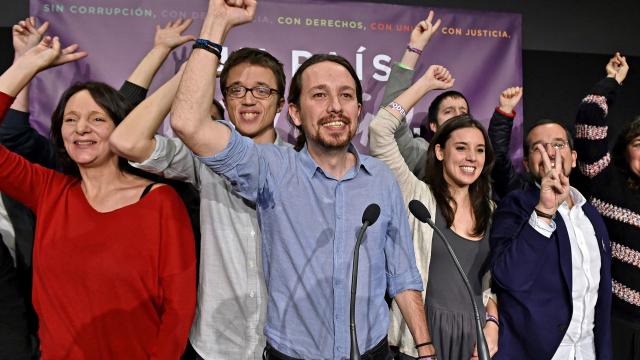
Spaniards wanted change, and at Sunday’s elections they got it. The two discredited parties that have run the country for three decades sank to historic lows while bright newcomers stormed their way into parliament. The upturned two-party system was tired and prone to cronyism, but it had one major advantage: much like Britain, it almost always produced stable governments. Sunday’s vote created an unprecedented mess, with the next government needing the support of up to five different parties.
The now-acting prime minister Mariano Rajoy began to discover on Monday that, despite his conservative People’s Party gaining most votes, it will be almost impossible for him to form a government and Spaniards were left wondering whether they will have to vote again by May.
Spain has been divided not just along left and right lines, but also over visions of how centralist or federalist it should be and, more recently, whether it needs old parties mired in corruption allegations or new squeaky-clean ones. In these conditions it is hard to find common ground between two parties, let alone five. That said, an era of cross-party consensus is what Spain needs as it seeks new models of all kinds, for its political system, its economy and the balance between its regions.
The most dramatic change is the appearance of anti-austerity Podemos, a party that only 19 months ago placed the pony-tailed profile of its leader, Pablo Iglesias, as its symbol on ballot papers for the European elections because, without it, many voters would not have known who they were. Meanwhile, Albert Rivera’s center-right Ciudadanos has proved that the high-handedness and blatant cronyism of Mariano Rajoy’s People’s party (PP) was increasingly unbearable to rightwingers and liberals who want a system where power does not bring the right to bend, manipulate or ignore the rules. The breath of fresh air blows in both directions and Podemos should recognize that the desire for regeneration is not a narrow ideological one.
Amid all the hype about insurgents and with the PP ahead in the polls, it was easy to ignore the clean-cut but unexciting Socialist leader, Pedro Sánchez. He was clearly leading his party to it worst drubbing in recent history and it duly sank to just 22% of the vote.
Yet as Spain wakes up to its most fractured parliament since the restoration of democracy in 1977, Sánchez holds the key to government. Rajoy has the most deputies but if he governs, it must be with the Socialists’ permission. Sanchez made clear on Monday that this will not be forthcoming, so it will be up to him to try stitching together a government backed by Podemos, the communist-led Popular Unity and either Ciudadanos or separatists from Catalonia. If he cannot do that, Spaniards must vote again.
A Podemos-backed Sánchez government would open a new anti-austerity breach on Europe’s southern flank, as Spaniards reject a new economic model based on low wages and extreme job instability. Unemployment is still 21% in Spain, and the country’s economy is smaller than it was in 2008. A vote for Podemos was also, in a confused and erratic European Union, a vote for increased sovereignty. Yet Spain is not Greece. Not only has its economy survived without being taken over by the troika – the European Central Bank, European commission and International Monetary Fund – but the eurozone’s fourth largest economy is much harder to bully.
The last laugh belongs to separatists in Catalonia. For the first time there is now a large separatist bloc which holds the balance of power between the left and the right. That is, perhaps, the most powerful proof that the status quo is bust. Basques and Catalans have held the balance of power before, backing both Socialist and PP minority governments. But back then the core bloc of Catalans termed themselves “nationalists” – basically regionalists demanding more money and autonomy without leaving Spain – rather than all-out separatists.
The rise of separatism, like the rise of Podemos and Ciudadanos, has much to do with Europe and the economy. An electorate that has suffered a double-dip recession and unemployment that peaked at 26% needed hope. Both Podemos and Catalonia’s growing separatists urge their followers to “smile”.
Part of the secret of Podemos’ success at these elections was to promise a referendum to Catalans, enabling it to win the race there. This appealed not just to separatists but to many of the majority of Catalans who wish to stay Spanish (support for a referendum is at 80%). On Sunday night Iglesias insisted that Spain was a “plurinational” country and that Catalonia needed special consideration in a rewritten constitution.
Yet the People’s Party, which tacks right when in opposition, has just enough deputies to block constitutional reform. Agreement has to be truly cross-party, or not at all. In all the heady talk about changing the constitution to enshrine social rights and find a place for Catalonia, however, it is easy to lose sight of the everyday priorities of many Spaniards. They want jobs, preferably secure ones rather than stumbling between short-term, low-pay contracts. This cannot be the long-term model for Spanish growth.
Four decades ago Spain surprised the world with a dynamic transition from rightwing dictatorship to democracy, catapulting itself in to the first division of world nations. The edifice built then is crumbling under the weight of abuse by a political establishment of parties, employers groups and trade unions who were handed exaggerated quotas of power to prevent the return of the authoritarians who had imposed their will for four decades.
The messy, fractured parliament elected on Sunday is as much an opportunity as a challenge. Politicians are obliged to do two things: talk and reform. Rajoy was right when he said: “It won’t be easy, but difficult times call for real politicians.”
If Spain’s politicians can reach broad, long-term agreements on everything from education to Catalonia, Spain’s second transition could start now. That may be too much to hope for. All depends on the calibre of those elected on Sunday.
3 WAYS TO SHOW YOUR SUPPORT
- Log in to post comments














